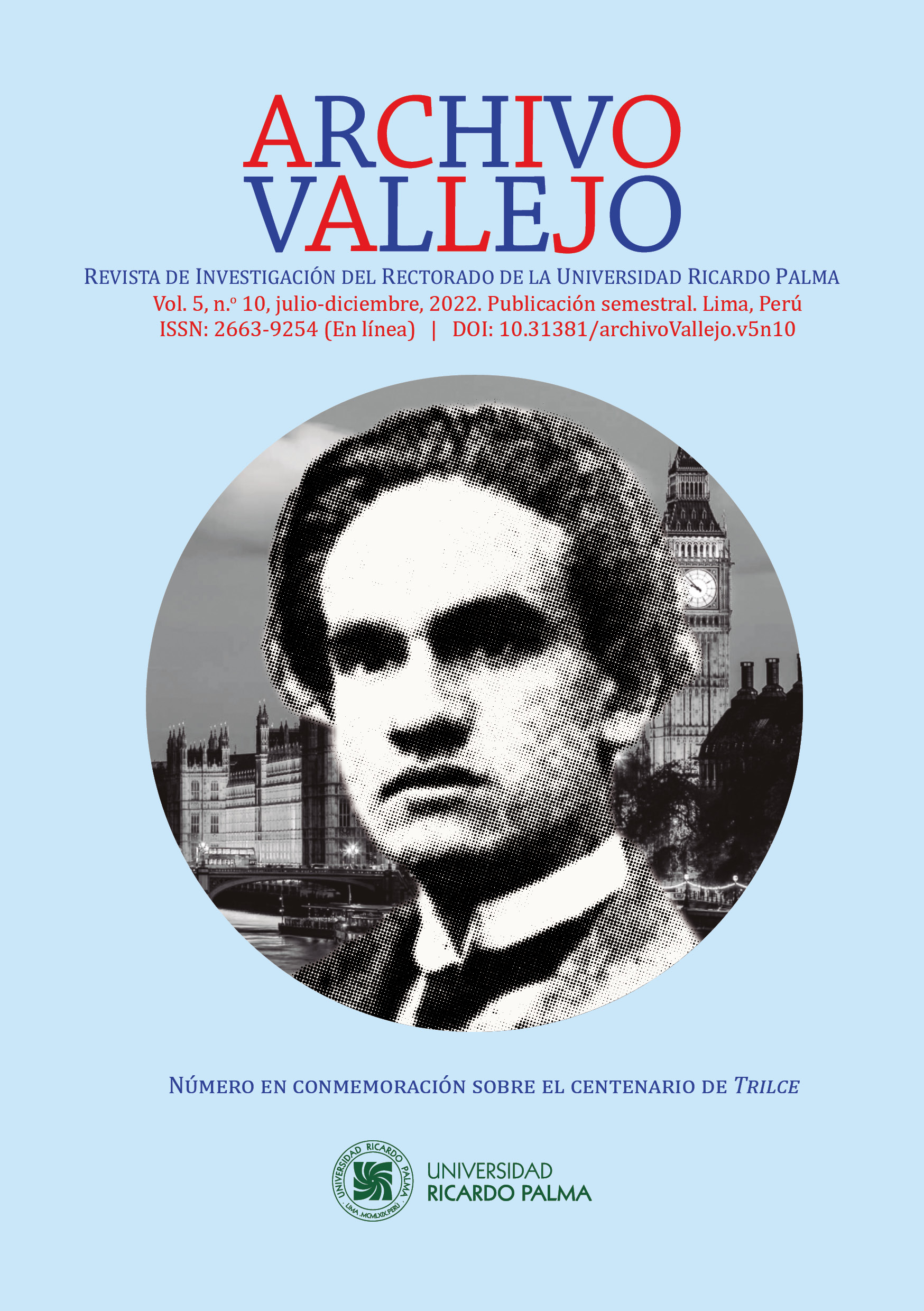César Vallejo solidario: Metonymy, secular transubstantiation, and socialist utopia
DOI:
https://doi.org/10.31381/archivoVallejo.v5n10.5326Palabras clave:
ética, socialismo, socialismo poético, metonimia, metáforaResumen
Este artículo explora dos características gramaticales, metonimia y metáfora, en relación con dos temas centrales: la melancolía de la muerte y la solidaridad entre los hombres, y cómo estos aparecen y funcionan juntos en la poesía de César Vallejo. Propongo que en la poética de Vallejo existe una cooperación entre metáfora y metonimia, en el sentido de que la conexión metonimical entre los elementos lingüísticos funciona en esta poesía como un sistema que metaforiza el mundo en todas sus conexiones en movimiento. Este artículo sugiere que estos sistemas de interconexión e interdependencia —lingüístico y físico— son muy similares al sistema científico-filosófico (es decir, epicureano) del De Rerum Natura, de Lucrecio. Esta comparación —concluyo— es importante para una comprensión renovada de la cosmovisión política y secular de la solidaridad, como aparece en la obra de Vallejo.
Citas
American Museum of Nature History (n. d.). Sweat of the Sun. https://www.amnh.org/exhibitions/gold/golden-ages/sweat-of-the-sun
Buelow, C. von (1989). Vallejo’s Venus de Milo and the Ruins of Language. PMLA, 104(1), 41-68. https://doi.org/10.2307/462330
Clayton, M. (2011). Poetry and Pieces: César Vallejo and Lyric Modernity. University of California Press.
Close, L. (1987). Vallejo, Heidegger and Language. In D. G. Coleman and G. Jondorf (eds.), Words of Power: Essays in Honour of Alison Fairlie (pp. 163-186). Glasgow University Printing Department.
Fernández, C. (2021). El camino a Trilce [Doctoral thesis, University College London]. https://discovery.ucl.ac.uk/id/eprint/10134889/1/
Fernandez_Thesis.pdf Fernández, C. & Gianuzzi, V. (2020, 26 November). El doctorado de César Vallejo. Vallejo & Co. https://www.vallejoandcompany.com/el-doctora do-de-cesar-vallejo/
Franco, J. (1976). César Vallejo: The Dialectics of Poetry and Silence. Cambridge University Press.
Gianuzzi, J. V. (2014). César Vallejo’s journalism in context: a quest for autonomy [Doctoral thesis, University College London]. https://discovery.ucl.ac.uk/id/eprint/1425690
Guzmán, J. (2000). Tahuashando: lectura mestiza de César Vallejo. Lom Ediciones.
Hart, S. M. (2007). Stumbling Between 46 Stars: Essays on César Vallejo. Centre of César Vallejo Studies.
Hart, S. M. (2013). César Vallejo: A Literary Biography. Tamesis.
Lucretius (1924). On the Nature of Things. Translated by W. H. D. Rouse; revised by M. F. Smith. Loeb Classical Library. https://www.loebclassics.com/view/lucretius-de_rerum_natura/1924/pb_LCL181.3.xml?readMode=recto
Martin, W. (2012). «Metaphor» and «Metonymy» entries. In R. Greene and S. Cushman (eds.), The Princeton Encyclopedia of Poetry & Poetics. Princeton University Press.
Moran, D. (2022, 14 October). Trilce XLVIII: More on Vallejo and Bergson. Vallejo Siempre [Conference]. V Congreso Internacional Vallejo Siempre, Christ Church, University of Oxford, Oxford.
Nancy, J.-L. (2006). Around the Notion of Literary Communism. In Multiple Arts: The Muses II (pp. 22-34). Stanford University Press.
Ricoeur, P. (2003). The Rule of Metaphor. The Creation of meaning in language (R. Czerny, K. McLaughlin and J. Costello, trans.). Routledge.
Rowe, W. (2013). The Political in Trilce. In S. M. Hart (ed.), Poetry, Poetics, Affect: Revisioning César Vallejo (pp. 3-19). Cambridge Scholars Publishing.
Vallejo, C. (2009). César Vallejo, The Complete Poetry: A Bilingual Edition. Edited and translated by Clayton Eshleman. University of California Press.
World Monuments Fund (2019, February). Piedras Negras. https://www.wmf.org/project/piedras-negras
Descargas
Publicado
Cómo citar
Número
Sección
Licencia
Derechos de autor 2022 Owen Fortunato Brakspear

Esta obra está bajo una licencia internacional Creative Commons Atribución 4.0.
Los contenidos publicados en la revista están bajo una licencia CC-BY 4.0, la cual permite:
- Compartir, copiar y redistribuir el material en cualquier medio o formato.
- Adaptar, remezclar, transformar y construir a partir del material para cualquier propósito, incluso comercialmente.
Bajo los siguientes términos:
- Atribución. Usted debe dar crédito de manera adecuada, brindar un enlace a la licencia, e indicar si se han realizado cambios. Puede hacerlo en cualquier forma razonable, pero no de forma tal que sugiera que usted o su uso tienen el apoyo de la licenciante.















